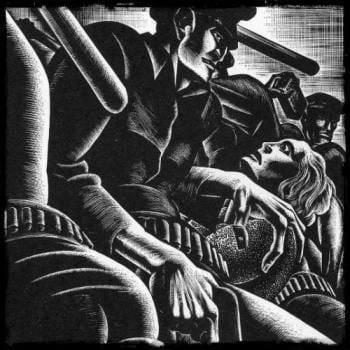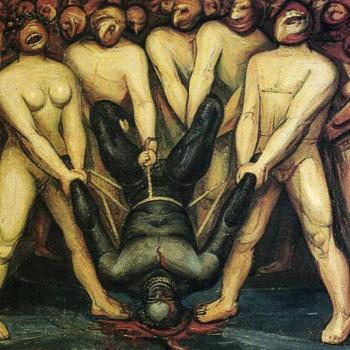This essay emphasizes how neo-Thomist Natural Law moral philosophy animates and defines the political and legal philosophy of Attorney General William Barr and his Federalist Society associates. First published in The Descent of Man Substack newsletter.
On November 15, 2019, Attorney General William Barr delivered the keynote address to the Federalist Society’s 2019 National Lawyers Convention. The speech got a lot of play, given its timing, with House Democrats well into impeachment hearings concerning the presidential conduct of Donald Trump, and given Barr’s own full-throated claims about the unlimited scope of President Trump’s executive powers. Barr did not disappoint, delivering a stemwinder about the Constitutional mandate for an untrammeled, no-account presidency.
Some five weeks prior to the Federalist Society lecture, in another high-profile address, this one at Notre Dame University, Barr had crackled with indignation about the collapsed sexual morals and generally licentious behavior of Americans, which served as the predicate for his claim that religion alone can promote and sustain citizen discipline and virtue needed to support free government. In the Notre Dame speech, Barr notably emphasized a different kind of dependence upon a supreme authority – “the guidance of Natural Law [emphasis added] – a real, transcendent moral order which flows from God’s eternal law – the divine wisdom by which the whole of creation is ordered. The eternal law is impressed upon, and reflected in, all created things.”
Natural Law is a stately medieval Catholic moral philosophy associated with the systematic theology of St. Thomas Aquinas, possessing a distinguished lineage in philosophical history but these days mostly studied and appreciated by a narrow coterie of conservative legal scholars, jurists, and advocates. Since the 1980s – with the election of Ronald Reagan to the presidency, the appointment of Edwin Meese to the office of the attorney general, the nomination of Antonin Scalia to the Supreme Court, and the establishment of The Federalist Society – Natural Law moral philosophy has been the hidden superpower for the conservative movement.
In this essay, I argue that we cannot understand William Barr’s influence as Attorney General, nor his theory of executive power, without reference to the tropes of Natural Law (specifically what has become known as the New Natural Law) and the transparency of their meaning to fellow conservatives, particularly those engaged on the fronts of the contemporary culture wars.
* * *
St. Thomas Aquinas’s grand synthesis of Aristotle and St. Augustine in the Summa Theologica spells out the principles of Natural Law philosophy, which both absorbs (from revelation and scripture) and communicates (into public discourse and legal practice) a specific understanding of the human individual as the summit of God’s creation, shaped in the reflected image of God himself. The vocabulary of Natural Law philosophy organizes itself around this concept of the imago Dei, which supports conceptions of practical law that must, by definition, defer to “higher laws” derived from holy texts of uncertain origins, with unverifiable truth claims, and hence with malleable implications. Natural Law tropes in Barr’s speeches that would possess familiar meaning to those listening include divine reflection, self-evidence, religious freedom, human flourishing, practical reason, and moral virtue.
The Catholic conservative moment in American politics emerged as a response to the Second Vatican Council (1962-1965), and more specifically to the crisis engendered by the 1973 Roe v. Wade decision. In the past 40 years, this conservative movement has more generally sustained itself as an organizational and intellectual presence best evolved to exploit and respond the cultural uncertainty and flux of our times.
Catholicism’s rich intellectual traditions – extending back nearly two millennia to Augustine of Hippo – have both flourished and foundered on persistent efforts to reconcile the competing claims and contradictions of the City of God and the City of Man. Unlike Protestantism, Catholicism at its core is a political religion, its spiritual mission explicit and active within its earthly institutions and activities, with dual commitments to cultivating virtue and wielding power that converge and are reconciled in the concept of “order.”
In this sense, Catholic Natural Law moral philosophy is “deontological,” concerned with duties and obligations incumbent upon humans as the creatures who occupy the summit of God’s creation, whose capacities for reflection and reason distinguish them from other life forms and confirm their unique and intimate relationship to God. For this reason, Catholic Natural Law moral philosophy presents itself as a historically antecedent and fully formed Aristotelian-Thomist alternative to the more recent philosophical assumptions of Humean skepticism and Cartesian mind-body dualisms that underpin the “liberal values” and the “secular humanism” to which conservative Catholics attribute the moral decay and collapse of the modern era.
* * *
The Federalist Society chose “originalism” as its theme for its 2019 convention, a lens on the law that has served for decades (along with “textualism”) as a flying buttress of the organization’s constitutional jurisprudence. The overlap between proponents of Natural Law moral philosophy and constitutional originalism as a legal philosophy is not perfect (one thinks of Robert Bork and, perhaps, Brett Kavanaugh, as outliers here). However, in public square conversations and in arguments before and on behalf of the courts, in decisions and in dissents, Natural Law precepts invariably arise and are deployed alongside originalist justifications, on behalf of conservative causes and outcomes. As legal and political conservatives have accumulated strength in their representation on U.S. federal courts and in U.S. constitutional jurisprudence, Natural Law moral philosophy has been read into nearly every conservative interpretation of founder intent and constitutional meaning.
Since the 1980s, the Federalist Society has been (as William Barr himself meaningfully noted at the outset of his November keynote), the “vanguard” expression of the conservative commitment, theologically conceived, to anchoring political life in the original, infallible meaning of the U.S. Constitution. The Federalist Society also shares with the Heritage Foundation and a host of other right-wing organizations an ingrained belief in the Natural Law as precursor to and ultimate measure of positive law. This conviction explains the backbreaking efforts of legal philosophers to demonstrate that the Constitution itself fully conforms to Thomist Natural Law precepts (a search on the Federalist Society website retrieves links to nearly 300 publications or events that refer to Natural Law).
In the past four decades, the effect of these undercurrents has been to shift American jurisprudence away from its historically hegemonic “New England Protestant” legal culture based on traditions of English common law, commitments to legal precedent, and philosophies of positive law and legal realism and toward an emergent Catholic jurisprudence based on Thomist Natural Law and a constitutional fundamentalism derived from the “sacred text” assumptions of revealed religion (eight of the most recent 12 justices have Catholic backgrounds).
We can therefore be sure that when Barr greeted his audience at the Federalist Society, the reference in his Notre Dame address to the significance of the Natural Law remained fresh in their minds, commingling warmly with his words about constitutional justifications for the unitary executive.
* * *
The “standard issue” Thomist version of Natural Law moral philosophy, while quaintly atavistic to a 21st century mind, illuminates the aspirational, soaring reach of Catholic teachings. Which makes it all the more striking that the underlying tone of both Barr speeches is exceedingly dark, a vision of the nation implacably threatened, from within and without, by unyielding, rapacious enemies. The speeches share, coming from an active U.S. Attorney General, an unprecedentedly partisan, hostile, bilious language, rife with insinuation that those whom Barr terms “secularists” and “progressives” are out to spawn chaos and to destroy religion, morality, and the rule of law – everything that has allowed the nation to grow and prosper, everything responsible for “American exceptionalism.”
Apocalyptic language particularly unhinges Barr’s Notre Dame speech, in which prefatory remarks about the constitutional and Natural Law foundations of religious liberty give way to a stream of generic references to the “moral chaos,” “social pathologies,” “monstrous invasions,” and “organized destruction” of the modern era. Barr inveighs against the “unremitting” modern assault of secularist progressives on religion and traditional values, the apostasy-fueling distractions of our digital age, and the limitless opportunities for indulging our physical appetites (despite the challenges of reconciling such fervor with such dissolution). He calls out the modern administrative State as the enabling power, the force multiplier, the irresponsible underwriter of the most deviant and destructive behaviors of our modern, godless society (despite the overwhelming levels of evidence, reported by Max Boot in a recent Washington Post column, of an inverse relationship, across nations, between religious conviction and social health).
According to Barr, the nation’s founders fully understood that “religion was indispensable to sustaining our free system of government,” because religion alone could tame and discipline the savage movements of the human heart. The centerpiece for this claim is James Madison’s 1785 Remonstrance Against Religious Assessments, from which Barr extracts the definition of religious liberty as “‘a right towards men’ but ‘a duty towards the Creator,’ and a ‘duty…. precedent both in order of time and degree of obligation, to the claims of Civil Society.’” While the gauzy sentiments of Natural Law filter through Madison’s Remonstrance the pamphlet in fact a systematic argument for the full disestablishment of religion from public life in a state that had already discovered its population to be not enormously interested in religion.
What connection exists between the legal conservative commitment to religious liberty and this dark, vindictive current of anger? In recent decades, legal conservatives have absorbed and deployed a cramped and twisted variant of Natural Law moral philosophy known as the “New” Natural Law (NNL). Articulated most fulsomely by conservative Catholic moral philosophers Germain Grisez, John Finnis, Hadley Arkes, and Robert George, NNL proponents rely on revelation, Church teachings, and universals deducible from the rational faculties God has gifted humans to trace a path from the ideas of Aristotle and Aquinas to current non-negotiable political positions on abortion, contraception, marriage, family, sexuality, and gender.
For NNL moral philosophers, behaviors outside the boundaries of the “natural family” – such as premarital sex, contraception, masturbation, homosexuality, and gender non-normativity – dishonor God and deform men. While references to “religious liberty” typically mean encompass freedom of worship for all faiths, religious liberty as a conservative trope today implies restrictions on policies and funding that support contraception, abortion, family planning, and other elements of female reproductive freedom that challenge established NNL doctrine and dogma about “human dignity” and the “sanctity of human life.” What we hear in Barr’s Notre Dame speech is the degree to which the sexual obsessions of NNL have today revitalized, framed, and shaped for public consumption some of the most traditionalist precepts and historically repressive impulses of Roman Catholic theology.
* * *
Some of those in the audience for Barr’s Federalist Society speech would have probably remembered the inaugural meeting of the Federalist Society in 1982, when Antonin Scalia disclosed the delicious secret that “among the Founders he greatly preferred Alexander Hamilton, the sexy bad boy of the Constitutional Convention, to its nerdy goody-goody, James Madison. Indeed, despite disingenuous protestations to the contrary (and as we’re reminded by the emergence of the National Conservative movement in the MAGA era), legal conservatives generally love the vigorous, independent executive first envisioned by Hamilton, an executive that projects its power far and wide, and does not concern itself overly much with trivialities such as human rights, international law, legal transparency, and the more inconvenient amendments to the Constitution.
In this spirit, Barr launched into his own address to the Federalist Society by renouncing the “grammar school civics class version of our Revolution,” the view that it was a rebellion against the tyranny of monarchy, and that the primary aim of the framers of the Constitution was to hobble executive power. As with his interpretation of Madison’s Remonstrance, Barr plays fast and loose with his history on this point, given that the governments of the individual states under the Articles of Confederation pretty uniformly eschewed creation of any independent, unitary executive authority (and so apparently subscribed themselves to the grammar school civics class version).
Nonetheless, from their “bumbling” experiences of governing during the war and within the framework of the Articles of Confederation, we learn from Barr that the framers of the Constitution agreed that the new government required a capacity to act with energy, consistency and decisiveness that only an elected, unitary, individual, and sovereign executive power could provide. Barr frosts this cake with various rococo embellishments one frequently encounters with legal historians of a certain age, the best example perhaps being his shout-out to the “Glorious Revolution of 1689,” which from his perspective shifted the pendulum unhelpfully away from the singular power of the British monarchy toward the parliamentary messiness and mushiness that was to follow.
* * *
Here we arrive at the key inflection point for Natural Law moral philosophy as it is presently understood and applied in the United States. In his Federalist Society address, William Barr deploys two additional tropes that would be familiar to many, if not most, of those in attendance: human flourishing and prudential judgment. The ultimate goal of Natural Law moral philosophy is human flourishing, defined as the exercise of all of the natural capacities gifted to us as humans by our creator. Human flourishing is a teleological aspiration – a fulfillment of our promise and potential through this active exercise of our capacities. Prudential judgment – sometimes referred to as practical reason or determinatio – represents the capacity to choose wisely in moments of stress or uncertainty, when information is scarce or imperfect.
In what some would regard as a tactical retreat from recent internecine warfare among Catholic conservative cognoscenti, human flourishing and prudential judgment also figure prominently in a muted defense of a politics grounded in Natural Law moral philosophy recently authored by Robby George and Ryan Anderson and published in the journal National Affairs. In this context, we should recall the importance of “order” for Catholic philosophical efforts to reconcile the dual commitments to cultivating virtue and wielding power. In this context, human flourishing requires and depends upon the “rightly ordered” pursuit of goals intrinsic to our fixed natures as human creatures.
In the Notre Dame and Federalist Society speeches, Barr’s deployment of these Natural Law tropes – divine reflection, human flourishing, prudential judgment – only serve to set in high relief an exceedingly dark vision of human nature that betrays terror (projected or otherwise) about the contingency, chaos, and violence that simmer just beneath the quotidian surfaces of our lives. The moral architecture of the laws of nature catalogued in the Thomist Summa may, after all, merely disclose what we stand to lose in our lives, not what we stand to gain. We never stop falling.
It is therefore useful to remember that Catholic philosophers and legal conservatives of the Natural Law persuasion have been reading their “originalist” interpretation of the unitary executive back into the Constitution since the Reagan era, and to consider why this might be the case. I’d like to propose that for the dominant constituents of the modern American conservative movement, those for whom Natural Law frames their perspectives on politics and the law, these ideas themselves are tools that claim for us, not grace or justification, but power, a zero-sum, terrestrial control of both bodies and minds that shields them from the terror of an infinite, God-emptied universe.
About The Creation Project
The Creation Project is a philosophical history on which I’ve been working for several years that explores the last millennium of western history from the perspective (loosely speaking) of complexity science. My premise, and the focus of my study, is the influence of the Catholic natural law moral philosophy first associated with Thomas Aquinas, which interposes Humans between God and Nature – in philosophically and institutionally interesting and important ways that prefigure the era of the Anthropocene and that, as a complex systems lens discloses, continue to press down upon, and deform us, as a species.
About The Descent of Man Newsletter
The Descent of Man is a daily newsletter of literature, philosophy, history & current affairs, with a focus on the last millennium of Western history. If you have enjoyed reading this post, you can subscribe here. It is free (with no advertising or obligation).












